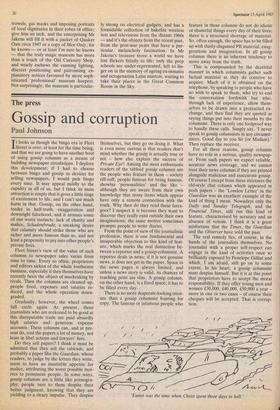The press
Gossip and corruption
Paul Johnson
It looks as though the bingo era in Fleet Street is over, at least for the time being, and that we are going to have another bout of using gossip columns as a means of building newspaper circulations. I deplore this development; if I had to choose between bingo and gossip as devices for selling newspapers, I would pick bingo every time. It may appeal mildly to the cupidity in all of us, but I think its main attraction is simply that it gives a little tinge of excitement to life, and I can't see much harm in that. Gossip, on the other hand, trades in half-truth, exaggeration and downright falsehood, and it arouses some of our worst instincts: lack of charity and malice, Schadenfreude, a sneaking desire that calamity should strike those who are richer and more famous than us, and not least a propensity to pry into other people's private lives.
Fleet Street's view of the value of such columns to newspaper sales varies from time to time. Every so often, proprietors and editors sicken of the whole loathsome business, especially if they themselves have recently been the object of muckraking by rivals. Then the columns are cleaned up, people fired, expenses and salaries re- duced, and the whole operation down- graded.
Gradually, however, the wheel comes full circle again. At present, those journalists who are reckoned to be good at this disreputable trade are paid absurdly high salaries and generous expense accounts. These columns can, and at pre- sent do, cost the papers a lot of money, not least in libel actions and lawyers' fees.
Do they sell papers? I think it must be admitted that they sell the tabloids, and probably a paper like the Guardian, whose readers, to judge by the letters they write, seem to have an insatiable appetite for malice, attributing the worst possible mot- ives to prominent people. In some ways, gossip columns are a little like pornogra- phy: people turn to them despite their better judgment, knowing that they are yielding to a sleazy impulse. They despise themselves, but they go on doing it. What is even more curious is that readers don't mind whether the gossip is actually true or not – how else explain the success of Private Eye? Among the most enthusiastic readers of the tabloid gossip columns are the people who feature in them – society riff-raff, people famous for being famous, showbiz 'personalities' and the like – although they are aware from their own knowledge that many items which appear have only a remote connection with the truth. Why then do they read these farra- goes? I suspect it is because they want to discover they really exist outside their own imaginations; the same motive sometimes prompts people to write diaries.
From the point of view of the journalistic profession, there is one fundamental and insuperable objection to this kind of feat- ure, which marks the real distinction be- tween a reporter and a gossip-columnist. A reporter deals in news; if it is not genuine news, it does not get in the paper. Space in the news pages is always limited, and unless a news story is valid, its chances of reaching print are slim. A gossip column, on the other hand, is a fixed space; it has to be filled every day.
There is no more desperate-looking creat- ure than a gossip columnist hunting for copy. The famous or infamous people who feature in these columns do not do idiotic or shameful things every day of their lives; there is a structural shortage of material. So, often enough, the space has to be filled up with thinly-disguised PR material, exag- gerations and imagination. In all gossip columns there is an inherent tendency to move away from the truth.
This is compounded by the deceitful manner in which columnists gather such factual material as they do contrive to acquire. Much of it is obtained on the telephone, by speaking to people who have no wish to speak to them, who try to end the conversation forthwith but who, through lack of experience, allow them- selves to be drawn into a protracted ex- change, and then find they are quoted as saying things put into their mouths by the columnist. There is only one foolproof way to handle these calls. Simply say, 'I never speak to gossip columnists in any circumst- ances. Good day to you Sir (or Madam).' Then replace the receiver.
For all these reasons, gossip columns have no role in a serious, quality newspap- er. From such papers we expect reliable, accurate news coverage, and we cannot trust their news columns if they are printed alongside malicious and inaccurate gossip.
Of course I except from these strictures the old-style chat column which appeared in posh papers – the 'London Letter' in the
Guardian was an excellent example of the kind of thing I mean. Nowadays only the Daily and Sunday Telegraph, and the Financial Times, still run this kind of feature, characterised by accuracy and an absence of venom. I think it is a great misfortune that the Times, the Guardian and the Observer have sold the pass.
The real remedy lies, of course, in the hands of the journalists themselves. No journalist with a proper self-respect can engage in the kind of activities once so brilliantly exposed by Penelope Gilliat and which, I am afraid, still go on to some extent. In his heart, a gossip columnist must despise himself. But it is at this point that proprietors have to accept the moral responsibility. If they offer young men and women £30,000, £40,000, 00,000 a year – more in one or two cases – of course their cheques will be accepted. That is corrup- tion.
'Easter was the time when Christ spent three days in hell.'














































 Previous page
Previous page